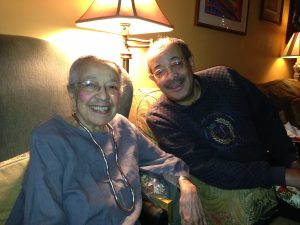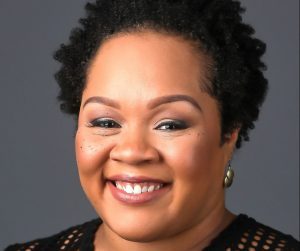I’m reading a book that I find interesting on the subject of race. It’s called Racecraft: The Soul of Inequality in American Life, written by scholar educators Karen E. Fields and Barbara J. Fields. As the title suggests race or “racecraft” has been a fraudulent social construct used against people of color just as witchcraft was used against women. In one section of the book, it points out the relationship of racism and classism. “From very early on, Americans wove racist concepts into a public language about inequality that made “black” the virtual equivalent of “poor” and lower class, thus creating a distinctive idiom that has no parallel in other Western democracies.” Racism in America continues to play out in physically, socially, emotionally, and economically catastrophic ways for Blacks.

Adelaide Cromwell and her son, Anthony “Tony” Cromwell Hill share a light moment.
As I reflect on Cromwell Day, I ask myself if we moved any closer to peeling back the onion to closely examine our own manifestations of justice or injustice? Were we able to collectively identify practices, systems or processes that should be changed, named, corrected, or duplicated right here on our campus? Did we learn from the legacy of our she heroes, Otelia and Adelaide Cromwell, both of whom paved the way for future generations through their scholarship and influence on the thinking of those following them?
I have been part of the Cromwell Day planning committee for many years and have witnessed the leadership year after year work to create its programming. We have come a long way even though it may seem that we are not making enough strides. We now have a structure that places Cromwell Day in a pivotal position to usher in a process for self-reflection and collective behavioral changes.
 This year’s keynote speaker Yamiche Alcindor attested to this notion of racecraft in her role as a political correspondent. In two of the workshops that I attended: the UPC student-centered Roundtable Discussion on Anti-Blackness and the data sciences program, No Such Thing as Neutral: Racism and Technology Design, we saw the menace of racecraft at work. Our students’ shared experiences, fears, struggles and hopes for the future gave us a lot to think about. Algorithms technology in internet engine searches and light technology in the photography and film industries systematically discriminate against people of darker hues.
This year’s keynote speaker Yamiche Alcindor attested to this notion of racecraft in her role as a political correspondent. In two of the workshops that I attended: the UPC student-centered Roundtable Discussion on Anti-Blackness and the data sciences program, No Such Thing as Neutral: Racism and Technology Design, we saw the menace of racecraft at work. Our students’ shared experiences, fears, struggles and hopes for the future gave us a lot to think about. Algorithms technology in internet engine searches and light technology in the photography and film industries systematically discriminate against people of darker hues.
The Cromwell Day theme “Tackling Anti-Blackness: Moving Past the Abstract” was designed to give us a chance to do something about what we need to change. Otelia and Adelaide Cromwell approached their work with practical application and vision. We need to do the same. “The excellence of Professor Cromwell’s training was reflected in her teaching…She developed among her students a keen appreciation of beauty and truth…She daily emphasized the value of thoroughness and open-mindedness in her own classroom preparation…The influence she exerted in her position cannot be easily estimated.” This quote from the D.C. Board of Education’s 1944 minutes sums up Otelia’s legacy. Influenced by her Aunt Tee, Adelaide employed the same methodology to mentor countless of up and coming young black professionals during her career. As a community of thinkers let us work to identify policies facilitated by racecraft. Let us dare to act as Otelia and Adelaide Cromwell did by having an open mind. Let us dismantle anti blackness behaviors wherever we find them. And let us preserve the sacredness of human life.
